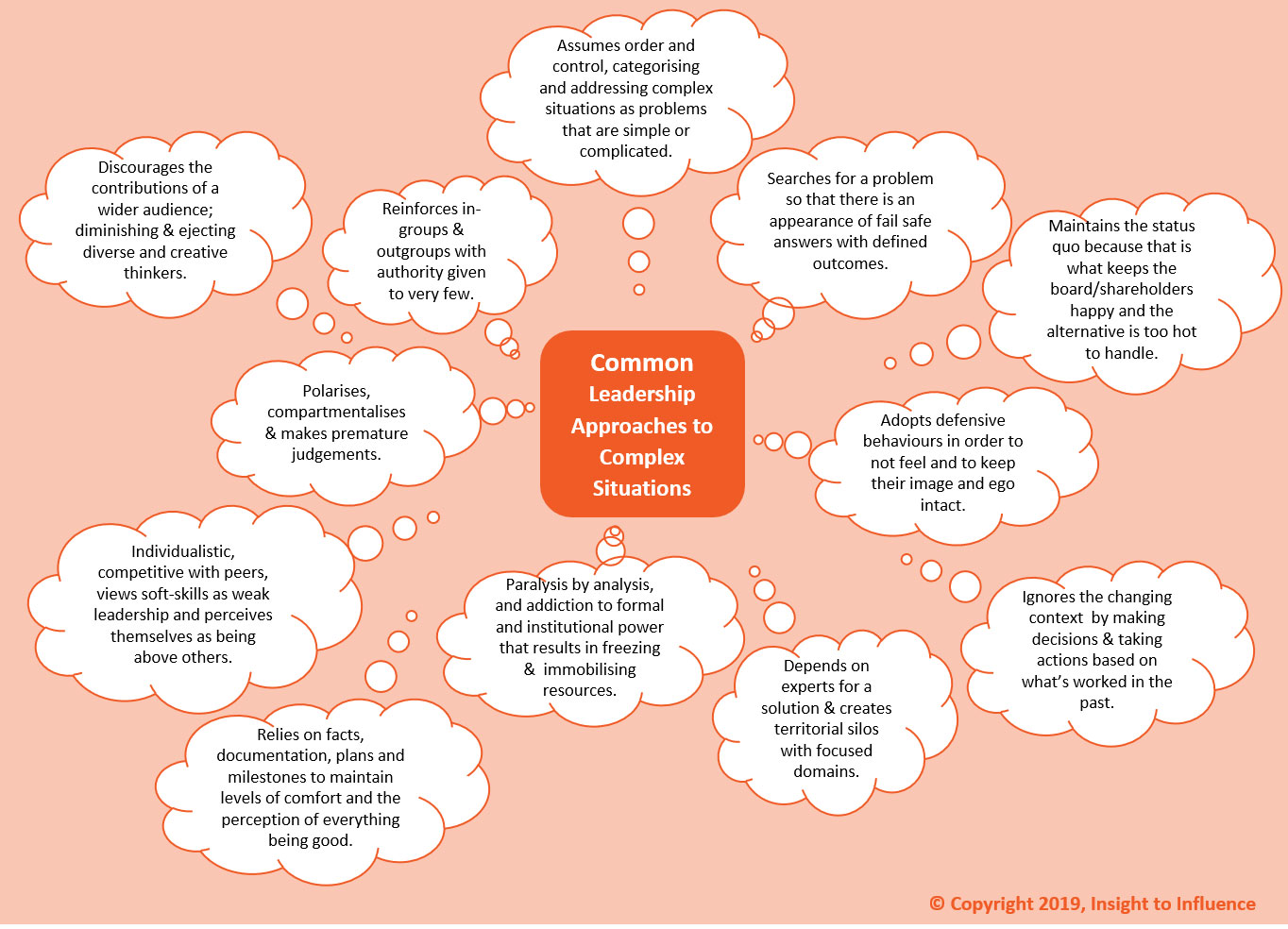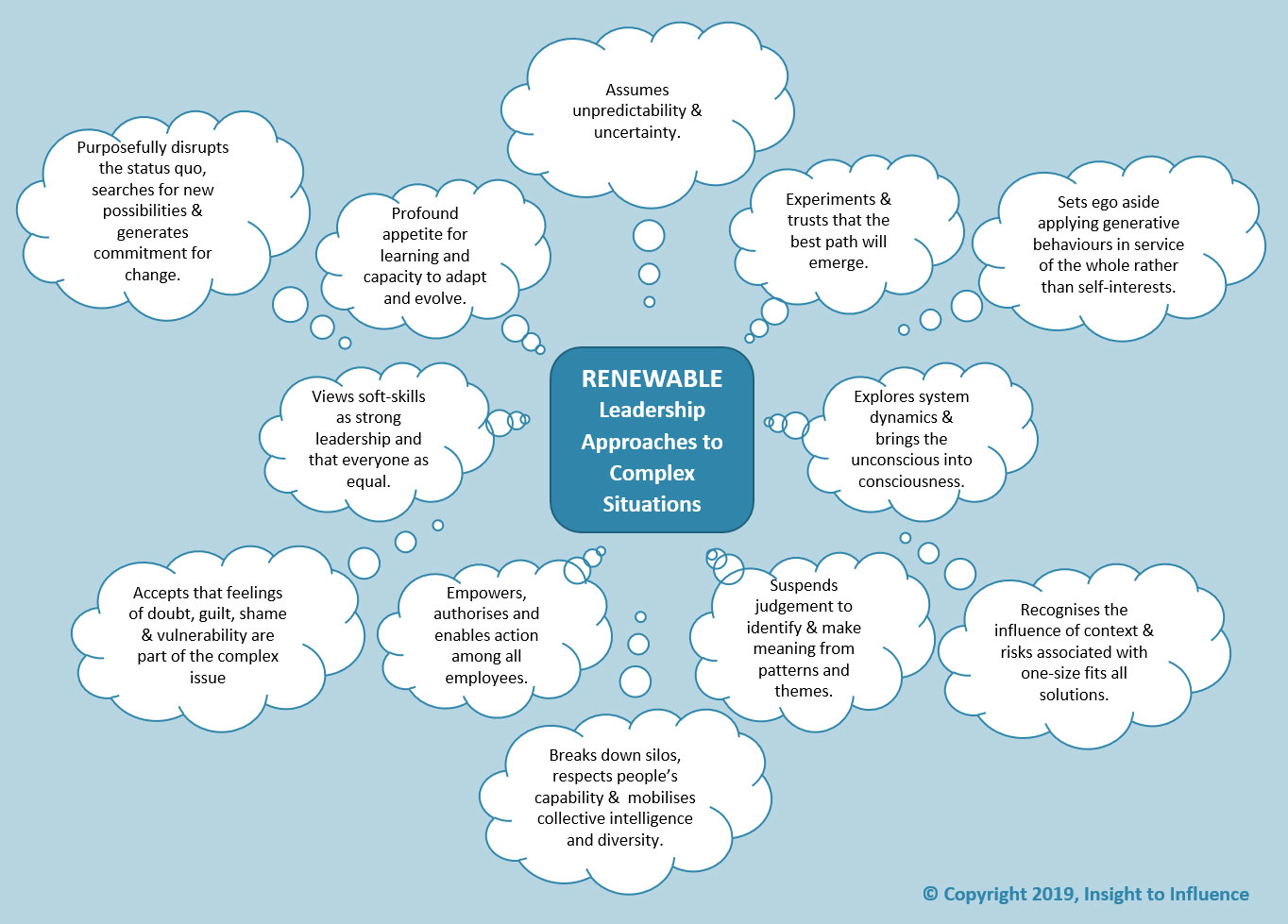The Call for Renewable Leadership
By Nicole Barrett, Psychologist
Sep 30, 2019

Last month I received an unusual gift from an existing client. Unusual in that it is rare to experience genuine collaboration with multiple consultants that share the same client and a gift because the offer to participate enabled the:
- consultants to identify and work with recurring themes across various industries in both the public and private sector;
- consultants to behave, model and work in ways that we firmly believe are required of leadership teams in the context of complex problems and rapid change;
- client to gain insights and make authentic and integrated progress; and
- emergence of the concept of ‘Renewable Leadership’ for these complex turbulent times.
To kick off the meeting, the client spent time overviewing the current state. In short, “everything is changing” and the context is becoming more and more unstable. This organisation is gearing up for major transformation where what they have always done will simply be no more. The complexity of the situation is exacerbated by challenges in getting the leadership team to align, operate as one and commit not only in the room with their peers but in their roles outside of the leadership team.
Sound familiar?
The discovery of systemic themes
As the consultants worked together, a number of common themes and patterns of leadership behaviours emerged. For example:
- Complex realities are those with ‘unknown unknowns’ (Sowden D, 1999) and therefore have no readily available solutions. This evokes anxiety in leaders and they tend to:
- name the complex situation as a problem as if there are ‘known knowns’;
- tackle this named problem as if it is complicated with ‘known unknowns’;
- compartmentalize and carve out lists of actions to various experts in a particular domain; and
- focus on plans, conversations, actions and topics that distract from the complex situation at hand.
While these approaches provide a level of comfort and reduce the leader’s anxiety, actually making progress in relation to the complex situation is imagined. These types of approaches reinforce silos and the opportunity for real creativity and progress is lost. The reality is, many leaders continue to do what they have always done despite the call for something very different.
- We are hopelessly dependent on the capitalist economic system that has produced the world we experience today. Despite all the best efforts and rhetoric about the need for diversity, innovation, emotional intelligence, adaptive and authentic leadership and agile teams, our leaders (at an unconscious level) are fighting to maintain the status quo - of the context, of their business and of their own minds. This gives the illusion that they are safe and can remain comfortable. The alternative to fight is flight and, in this instance, leaders become paralysed and do nothing.
From a behavioural perspective the above patterns are not surprising. From birth we are conditioned to obey and conform in ways that keep the family unit intact and functioning. We are praised and loved when we please mum and dad (or any authority figures) and we are punished or experience disapproval if we rebel or disturb the family system. These same dynamics exist in all systems including organisations. Disruption or doing things differently goes against everything we have ever known and taking such action comes with great anxiety and risk.
We may think we have progressed, yet many leaders are stuck. They haven’t and can’t progress until we become better equipped to identify, name and work with the unconscious system dynamics that perpetuate the status quo and are present in our everyday lives. In many ways, with so much change and anxiety in the world today, we are at risk of going backward, reverting to industrialised patterns of command and control over the production line because we are addicted to being driven by economic growth and determined to hang on to traditional mental models of the paternal and omnipotent leaders that 'know what’s best'. We continue to observe leaders responding to the demands of formal and institutional power instead of hearing the call and attending to the moral, social and cultural power as well.
The path to renewable leadership
16-year-old Greta Thunberg’s speech to world leaders at the UN Climate Action Summit captured the essence of my point here. She passionately said that, “All you can talk about is money and fairytales of eternal economic growth... you pretend that this can be solved with just business as usual and some technical solutions. There will not be any solutions or plans presented in line with these figures here today because these numbers are too uncomfortable and you are still not mature enough to tell it like it is. You are failing us, but young people are starting to understand your betrayal. The eyes of future generations are upon you... The world is waking up and change is coming whether you like it or not.”
The responses to Greta’s speech highlight the distraction practices inherent in the way we lead and see the world. There is talk from giving her a peace prize to giving her a snickers bar to defuse her anger. These are distractors from the complex situation in her message. If we make ourselves busy with these then we are taking the easy path and Greta’s call out to us is negated so that the comfort of the status quo (that is leading us to our demise) is maintained.
Baby boomers, Generation X (and even Y) need to wake up to the insanity of hanging on to the old. The repetition I observe in organisations is mind blowing and espousing they are doing things differently is, in most cases, a fantasy they tell themselves to ameliorate the anxiety – a very powerful emotion that can hijack conscious and purposeful exploration of new possibilities.
To survive, the time for a new wave of leadership practices is now. As the world transitions away from carbon energy to renewable energy, what are the possibilities if there was Renewable Leadership? A fundamental shift in leadership practices that challenge systemic patterns to maintain security and comfort (or the illusion of) and instead, taps into the rich diversity of the natural resources that are available.
When addressing complex situations, the following represent what we commonly experience and observe in leadership teams against the renewable leadership practices required to transform complex situations and decision making.
Common Leadership Practices

Renewable Leadership Practices

Tips for developing your Renewable Leadership
- Expose where capitalistic enrichment principles are driving your thought processes and actions.
- Co-operate, collaborate and act jointly in order to untangle (rather than solve) the complexity at hand.
- Avoid making the situation into a defined problem to decrease anxiety by generating a solution.
- Avoid complicity and willful blindness by empowering self and others to call out, challenge, witness and question.
- Own that what you know now may not be helpful and stimulate yourself and others in search of what you don’t know.
- Beware of the seductive distractors that prevent you from facing the complexities of the reality.
- Feel deeply, let shame, vulnerability, guilt and anger in, and then work with it to uncover what you haven’t yet seen.
- Go to the context first and work from the outside in.
- Beware of enriching the predatory few.
- Commit in public and perform in private.
- Beware of semantic solutions to narcissistic problems.
- Avoid slipping into the easy, quick conversation or perspective in response to the complex situation – this is likely to be a distraction.
- Identify when you are avoiding the work and beware of comfort and familiarity.
- Set the ego aside, find the soul of the whole and accept all others as your equal.
- Understand that what you see is not real, it is a reflection of your internal perception.
Contact Insight to Influence for information about coaching for renewable leadership and our leadership team development programs.
Register to receive regular updates from our Insights Blog
Follow Insight to Influence on LinkedIn
Follow Insight to Influence on Facebook